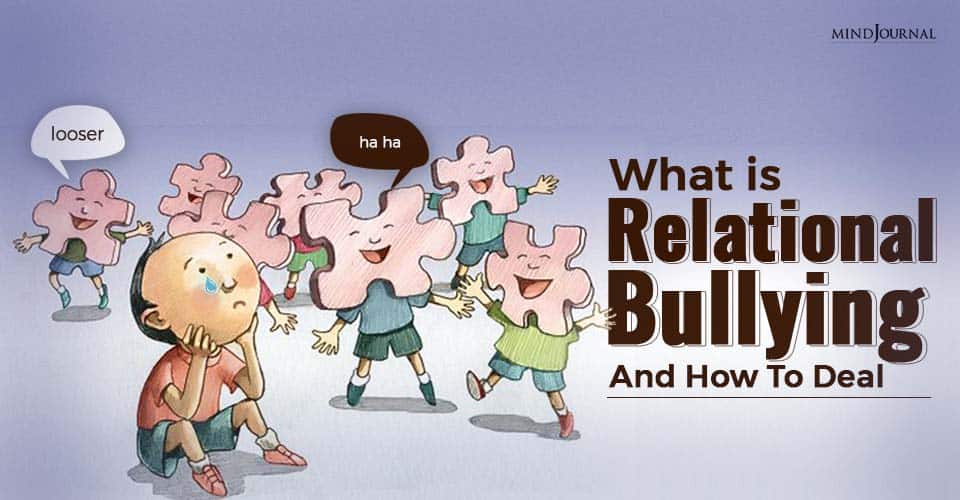Everyone knows what bullying is, and understands the ramifications it can have on a child. But, relational bullying can sometimes be worse.
Growing up, many of us heard the typical sayings: “boys will be boys,” “girls are just mean sometimes,” and “it’s part of growing up” whenever our peers were teasing or making fun of one another. There wasn’t the understanding or acknowledgment of what this “rite of passage” could do to our self-esteem, long-term.
Sometimes, the word “bullying” was even used, but there never was quite anything as specific as “relational bullying” discussed.
But what does the term “relational bullying” really mean? Why is it important to understand what this looks like? AND How do we address this kind of bullying with our children?
What does “Relational Bullying” mean?
Relational bullying is the type of bullying where people gossip behind someone’s back, spread rumors, ignore and leave others out. Girls are more likely to participate in this type of bullying. For example, one girl could start a rumor that another girl is pregnant.
Then, when the victim of this rumor confronts girls who are talking and spreading this rumor, these girls might ignore the victim and exclude her from their conversation. The victim has difficulty addressing the rumor and there is no actual proof of who started it.
Related: Sibling Bullying and Abuse: Signs and Effects
Why is it so important to understand and identify relational bullying?
What makes relational bullying so scary, and why this is so important, is that it is hard for concerned adults to spot. Like in the example above, it may be difficult to identify who started a rumor. It is hard to tell when a child is being actively excluded by a group or “just doesn’t want to hang out with them anymore.”
Also, adults don’t often hear about rumors or exclusion until the victim’s self-esteem has been damaged and he or she is asking (or crying) for help. Relational bullying is emotionally abusive to the victim and leads to long-term emotional effects.
Related: How Childhood Bullying Damages Adult Life
How do we address relational bullying?
If you have a child who is being relationally bullied, it is important to talk to them and assess the intensity. Start by being empathic and asking open-ended questions to your child to find out what is being said. It is important that you do not tell them how they feel, but rather ask how they are feeling or if they are feeling a certain way. Let them express their own experience, in their own words.
Secondly, there needs to be a plan of action to stop this bullying. If your child says he or she will handle the relational bullying on his or her own, it is important for your child to communicate what the plan will be, so you can follow up.
If relational bullying is getting worse and your child is getting more upset, it is important to speak to the school and make sure a plan is put in place to help your child feel supported. Children do not always want to share what is going on in their lives or have their parents solve their battles for them.
It is important for you to work more as a coach and support system with a clear plan of action and follow-up. It is important that your child has a chance to take care of the bullying on his or her own. However, your child may require additional coping skills and work with a therapist to improve his or her self-esteem.
It may be important for your child to see a therapist if you see your child getting more depressed and isolating away from others. Each child’s response to relational bullying is different, so having a mental health professional assesses the effects of this type of bullying could be very helpful to your child’s well-being.
Most importantly, there must be action taken when your child is being relationally bullied. Please do not allow this behavior to continue. Provide necessary support and action. If you let it go, looking at “mean girls” or “boys being boys” as a “rite of passage,” the long-term effects could be heart-breaking.
Written By Danielle Matthew
Originally Appeared In Empowerment Space
Relational bullying can have a horrible impact on your child, if not checked and handled at the right time. It will not just harm their childhood, it will affect them emotionally and mentally when they become adults even. This needs to be taken seriously and should be nipped in the bud before it’s too late.
Frequently Asked Questions
What can you do to stop the culture of bullying?
You should be clear on what qualifies as bullying and address the behavior. Specific rules should be in place and strictly enforced without any exception. All adults, parents, and kids should be educated and sensitized on the long-term effects of bullying.
Which is the best technique for dealing with bullies?
First, try ignoring the bully’s comments; if it doesn’t work, stand up against them, and do so in a public place. Report them so that they can face the consequences of their action. If you’re alone with them, try to stay unconcerned and don’t react.
How does being bullied make you feel about yourself?
Being bullied can damage a person’s self-confidence. Bullied kids can develop depression, anxiety, and eating disorders and perform poorly at school. Bullying leads to long-term mental health issues that can even show up much later in life.











Leave a Reply